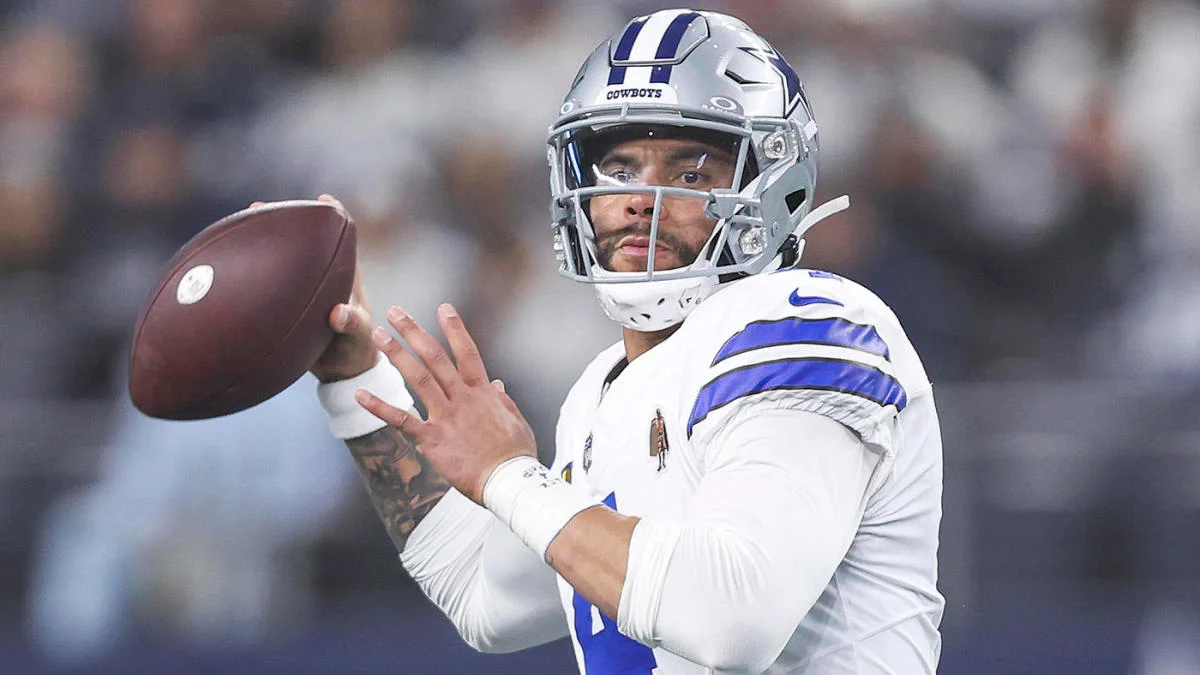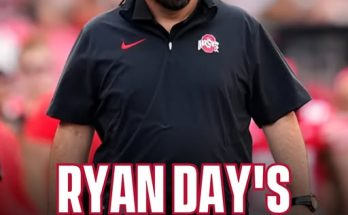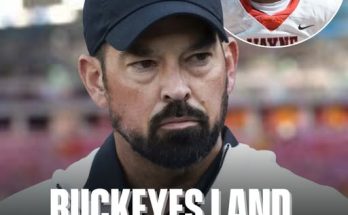The Dallas Cowboys are America’s Team for a reason—big games, big stars, and even bigger storylines. But now, just months ahead of the 2025 NFL season, a bombshell development has emerged from inside The Star in Frisco. A quietly embedded clause in Dak Prescott’s contract has come to light, and it’s sent tremors through the organization, raising serious concerns about the team’s future flexibility, roster construction, and even leadership stability.
As the Cowboys prepare for the NFL Draft and navigate one of the most pivotal offseasons in recent franchise history, the revelation of this clause—a rarely used “automatic no-tag” stipulation—has left them in a financial and strategic bind that no one saw coming, or at least, no one outside the building.
A Contract Cloaked in Complexity
When Dak Prescott signed his four-year, $160 million extension with the Cowboys in 2021, it was widely viewed as a win for both sides. Prescott secured generational wealth and long-term security after a devastating ankle injury, while the Cowboys locked up their franchise quarterback in his prime. The deal included a $66 million signing bonus and $126 million guaranteed—record-setting at the time.
But buried within the fine print of the contract was a provision that now looms large: a clause that prevents the Cowboys from applying the franchise tag on Prescott once his deal expires after the 2024 season. That’s right—come March 2025, Prescott can walk into unrestricted free agency, and Dallas will be powerless to stop it.
This kind of clause is exceedingly rare, especially for quarterbacks. Teams have traditionally used the franchise tag as a tool to retain control over elite talent—particularly quarterbacks—buying time to negotiate long-term deals or bide time for succession plans. But for Dallas, that safeguard is off the table.
And now, they’re caught flat-footed.
How Did This Happen?
To understand the magnitude of the situation, one must revisit the negotiation timeline between Prescott and the Cowboys in the years leading up to his current deal. For two years, the Cowboys dragged their feet on committing long-term to Prescott. He played on the franchise tag in 2020 and suffered a season-ending injury, yet still bet on himself—and won.
By the time the Cowboys returned to the table, Prescott and his representatives had the leverage. He was healthy again, performing at a high level, and the team had no succession plan in place. In exchange for agreeing to a four-year deal rather than a five-year one, Prescott’s agent reportedly insisted on the “no-tag” clause as a measure of control and freedom at the end of the deal.
The Cowboys—eager to avoid another tag standoff and desperate to get their quarterback back under contract—agreed.
Now that clause is rearing its head.
Why the Cowboys Are Cornered
Fast forward to 2025. The Cowboys are coming off another playoff disappointment. Mike McCarthy is gone. Defensive coordinator Dan Quinn has taken the head coaching reins. The roster is aging in some areas and thin in others. The team is staring down major contract extensions for Micah Parsons and CeeDee Lamb. And now they have no guarantee that their starting quarterback will be on the roster beyond next season.
Without the ability to use the franchise tag, the Cowboys face two stark options: negotiate a new long-term deal with Prescott before the end of the 2024 season or watch him hit the open market with no strings attached. Either option comes with enormous risk.
Negotiating now gives Prescott the upper hand. With the salary cap rising and quarterback contracts escalating across the league, he could demand north of $55 million per year—figures in line with what Joe Burrow, Patrick Mahomes, and Josh Allen are earning. If Dallas balks, he can play out the final year of his deal and test the market, where quarterback-hungry teams will line up with blank checks.
If they wait, the price could go even higher—or Prescott could decide he’s ready for a fresh start.
The Treacherous Terrain of QB Free Agency
The NFL is a quarterback-driven league, and true franchise quarterbacks almost never hit the open market. Prescott would be an instant prize in 2025 free agency, rivaling Kirk Cousins’ 2018 departure from Washington in terms of league-wide impact—but with far more pedigree.
Imagine a world where teams like the Pittsburgh Steelers, Las Vegas Raiders, or even the New England Patriots enter 2025 with quarterback uncertainty. The prospect of acquiring a proven, durable, playoff-caliber signal caller without trading draft picks would trigger a bidding war. And the Cowboys would be powerless to intervene.
No franchise tag. No exclusive negotiating window. No way to match offers.
Unless Jerry Jones acts preemptively, this could go down as one of the most significant contractual miscalculations in Cowboys history.
Inside the Front Office
Sources close to the organization suggest that the Cowboys are deeply divided on how to proceed. Owner Jerry Jones remains publicly committed to Prescott, often lauding his leadership, toughness, and marketability. But younger voices in the building—led by Executive Vice President Stephen Jones and key cap analysts—are wary of overcommitting to a quarterback who, while solid, has not proven capable of taking the team past the divisional round.
There’s also a philosophical shift underway in the league. Teams like the 49ers and Ravens have demonstrated success by investing heavily in defense and surrounding a young quarterback with a dominant supporting cast. The Cowboys, meanwhile, have long operated under the assumption that the quarterback must be the center of gravity—and the payroll.
This crossroads presents a dilemma. Do they double down on Prescott and reconfigure the roster around another massive quarterback contract? Or do they explore a reset—possibly using a 2025 draft pick to select a rookie quarterback and reallocate resources across the roster?
Without the tag as a fallback, that decision has to come sooner than later.
How It Affects the Draft and Free Agency
The uncertainty surrounding Prescott’s future is already impacting Dallas’s offseason strategy. Reports indicate the Cowboys are doing due diligence on quarterbacks in the 2025 NFL Draft—not necessarily to replace Prescott immediately, but as a hedge against potential chaos.
If they wait until next offseason and fail to secure a new deal, the team risks entering 2025 without a viable starting quarterback, or worse, being forced into desperation moves.
The Cowboys also face difficult decisions in free agency. Micah Parsons is eligible for a record-setting extension. CeeDee Lamb wants to reset the wide receiver market. Left tackle Tyron Smith is gone, and holes remain at linebacker, safety, and along the offensive line.
Every dollar spent now could reduce their flexibility to extend Prescott—or replace him.
The Locker Room Dynamic
Internally, Prescott remains a respected figure. Teammates have publicly supported him throughout his tenure, and his leadership during the McCarthy era was widely praised. But questions are beginning to emerge in the locker room, especially after a 2024 season that ended in disappointment.
Will Dak commit long-term to Dallas? Is he worth the kind of contract he’ll command? And can the Cowboys win big with him?
These are not whispers anymore—they’re echoing louder in hallways, weight rooms, and meeting rooms across The Star.
The Trey Lance Factor
One under-discussed wrinkle in this saga is the presence of Trey Lance on the roster. Acquired in 2023 from the 49ers, Lance has yet to meaningfully play, but the Cowboys have kept him around as a developmental option. He’ll likely get extended reps in training camp, and sources suggest the team is eager to evaluate him more fully this offseason.
Could Lance be the heir apparent? Or is he simply a placeholder until a rookie is drafted or a free agent is signed?
Either way, his presence gives the Cowboys at least a modicum of leverage in negotiations—but only if he shows signs of being a starting-caliber quarterback. Otherwise, he’s just another incomplete puzzle piece.
A Legacy on the Line
For Prescott, this could be a career-defining year. He’s already the fourth-longest-tenured starting quarterback in Cowboys history, behind legends like Troy Aikman, Roger Staubach, and Tony Romo. But unlike those icons, he hasn’t been able to deliver a Super Bowl—or even an NFC Championship appearance.
If he plays out his contract and tests free agency, he risks being remembered in Dallas as a good-but-not-great quarterback. If he stays and finally breaks through, he could cement his legacy as the man who brought glory back to Big D.
For the Cowboys, it’s more than legacy—it’s about identity. They must decide whether they want to remain beholden to Prescott, or if the time has come to turn the page and build something new.
What’s Next?
Time is ticking. The Cowboys have until the end of the 2024 season to strike a deal—or risk losing their most important player for nothing. Extension talks are expected to intensify after the draft, but sources close to both sides say the negotiations won’t be easy. Prescott wants to be paid like a top-three quarterback. The Cowboys want performance to match price.
Meanwhile, fans are left watching with bated breath. Will Jerry Jones make one last splash to secure Prescott’s future? Or will this “secret clause” go down as the detail that unraveled a decade of promise?
One thing is clear: the clock is ticking, and the pressure is mounting. In Dallas, where every season is Super Bowl or bust, the outcome of this contract saga could define the next generation of Cowboys football.



